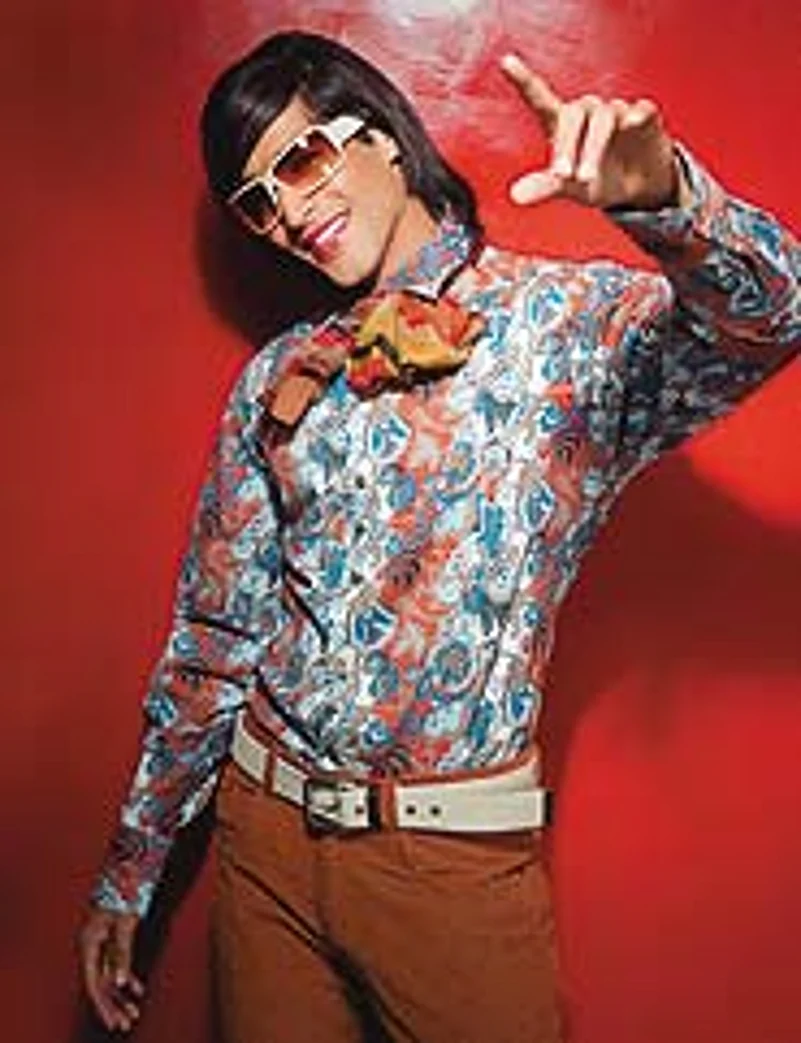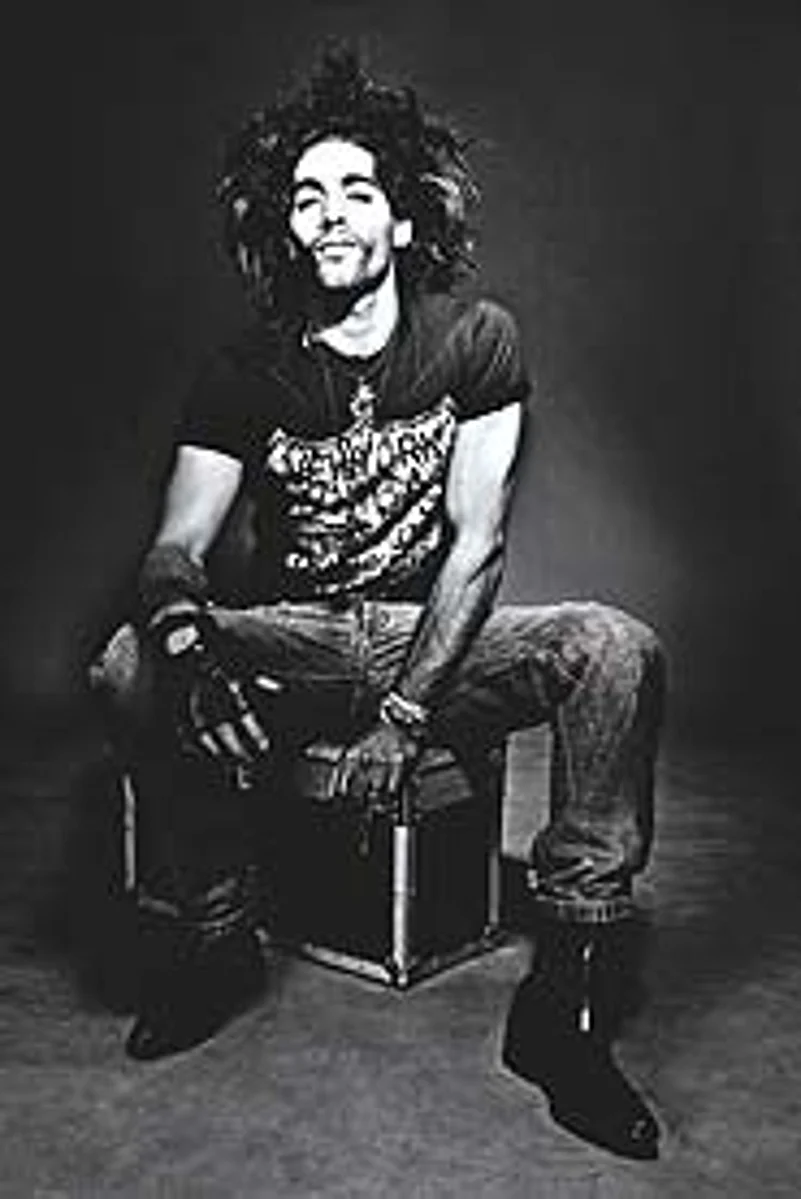This would have made no sense to Manu, who, in Manusmriti Part V, wrote: "A husband must be constantly worshipped as a god by his faithful wife." Manusmriti has long been obsolete. Now, even patriarchy is losing its shine. Being macho is not manly anymore. Being adaptive is. Aggression is out, companionship is in. Being an aloof father is a loss for men. Being a hands-on dad defines fatherhood. Being the attention-seeking son-in-law is passe, being caring is what male virtue is about.

| ’60-70s: Jumpin’ Jack Flash: After half-a-century of B&W media, colour is born. And how. Primary, even primal, tones screamed. Those majestic bouffants came down in an acid rain. Bruce Lee and Big B in bell bottoms. Hippie stew boiling. |
Don’t get it wrong. The new man is not a wimp. He may be a dishwashing daredevil, but he loves football and masturbation. He lusts for stag parties and gapes at women’s breasts. Only, he is a lion who may not roar. The bull that chooses not to fight. As our survey discovered: for the new man, sex and the women in his life are equally important. Alpha Male Lite. All yours.
"Raja is a good father, that’s why I am successful. He does what a mother would do for a child," says Mumbai-based TV actor Shweta Chaudhary, of her husband. Shweta plays Prerna in the popular tele-serial Kasauti Zindagi Ke and she and her husband are a dancing couple on Nach Baliye. Even as she was struggling with her career, Raja put his auditions on hold to look after their daughter, packed the wife’s lunch, dropped and picked her up everyday. He didn’t allow her long absences or her success to bruise his ego. It’s not the work that he does, as Shweta rightly points out. It’s the attitude.
Raja is your new Indian man. Secure enough not to be threatened by a woman’s worth. Quite like S. Balakrishnan, an engineer from Chennai who now runs his firm called Trendz. When his wife of fourteen years, Nagalakshmi, had to shift to Hyderabad as a crucial career move, he facilitated her by managing their house and son back in Chennai. He doesn’t resent the swap. Nor does S.K. Shroti, an amateur painter from Bhopal. If you visit him in the afternoon, you would see him changing his baby’s diapers or clearing the dining table. His wife, a bank officer, works regular hours, six days a week, and he "has no fixed working hours, no office, no regular income". He says this without any signs of a punched male ego.
These men haven’t changed overnight. Nuclear families, the defiance of family rules by women and their employment, has created aggressive identities. "Identity is formed by internalising traits and attitudes of early caretakers," says Delhi-based psychoanalyst and psychotherapist Dr Madhu Sarin, adding that it depends on "how these men were socialised, who raised them and how their mothers and fathers negotiated their relationships".
Who raised them is very important. Those brought up by strong women, convinced about their choices instead of being guilty, find it easier. When these guys come of age, the change is already in place and they naturally treat women as equal partners. For the older ones, raised by conventional parents, it is not so easy.
Simran Bhargava, who anchors One Life To Love, a life-skills programme on NDTV Profit, found this amplified in a free-wheeling discussion on her show with men between 20-50. "Those under 40, who live in cities and have working women as wives, find the new equation easier to handle. Most of all, the first generation of young adults raised by working mothers," says Bhargava. Even otherwise, Bhargava thinks there is more permission for men to be themselves. "They flex their feminine side, proudly go to PTA meetings and are able to share their failures. They even cry more easily and indulge in ‘me-time’, earlier very female things to do," she adds.

’80-90s: Net Reality: This is when all kinds of worlds collided to fashion something new: nobody quite knew what. The easing of licence raj, the tightening of fabric, the debris of punk and grunge, a virtual nowhere and everywhere. |
Dr Sarin, who’s worked in different cultures, believes Indian men have always been more feminine. "Westerners experience Indian men as androgynous. There is tenderness, compassion, passivity, openness to feeling in them—all a part of the Indian psyche," she says. "Till our culture valorised controlling men, that’s what they were. Now those rigid definitions are shifting. So people are honest about how they feel. And that’s what freedom is about," she adds.
Freedom is an operative word here. Men’s liberation stems from their acceptance of women’s freedom. It has the promise of sexual intimacy and better communication. "For men, it is a great relief. It is not so great being patriarchic all the time. Just as it is not easy for women to be superwomen all the time," explains Sarin. Peeyush Dubey, a senior executive with Infosys in Bangalore, will agree. Sharing is easier, domination tougher, he thinks. "Concern, sharing and mutual respect must be demonstrated in action," says the thoughtful Dubey who has been with his wife through her recent delivery in Ahmedabad, spending sleepless nights taking turns to look after his newborn while she rests.

| 21st Century : La Di Dah: Manliness, it seems, is a many-splendoured thing. The pliant fall of soft linen over the caveman’s frame apparently has a transformative effect. Is there a new man on the horizon or—from Bal Thackeray to Rohit Bal—has the old male over-corrected himself? |
Sanjiv Dua, director, Integrated Control Systems and a product of IIT Delhi, can’t agree more. "I have met many intelligent and independent women and realised that the traditional roles of domination and subordination cannot work. A modern marriage will be successful only if both partners are equal," he says. Dua is a self-indulgent, new-age man. He splurges on clothes and accessories and plays golf. But when it is his turn to cook or baby-sit, he doesn’t shirk it.
Being the sensitive, new-age guy sounds good, but does it hurt men from inside? It’s a question few of them want to answer. Call them the new women and they baulk, insisting that they rule the roost at home. Call themMCPs and they refuse to be a part of your story. Between men’s own needs and the expectations of the women in their lives, the waters are deep and dangerous.
All transitions are painful, even those that lead to better situations. The heavy hand of tradition is difficult to shake off, especially for those in power. Abdication is often a difficult choice for men. Even if there is no other alternative.
By Shefalee Vasudev with S. Anand in Chennai, Chander Suta Dogra in Chandigarh, Payal Kapadia in Mumbai, Wasbir Husain in Guwahati, Jaideep Mazumdar in Calcutta, K.S. Shaini in Bhopal and R.K. Misra in Ahmedabad

























